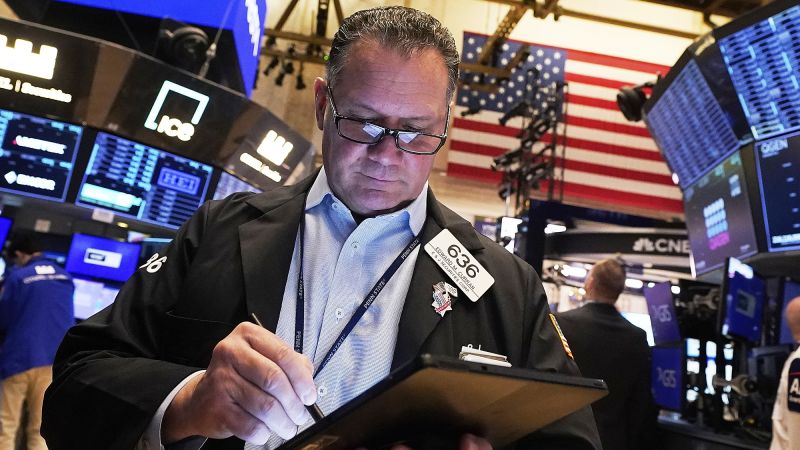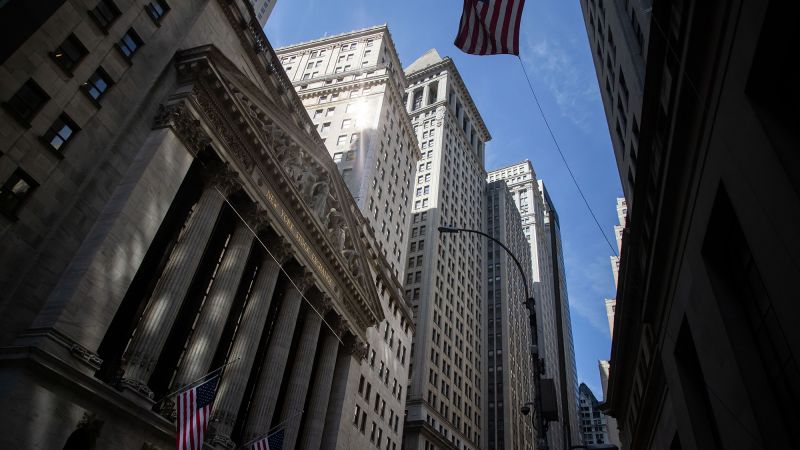US Stock Market Experiences Decline Amid Trade Negotiation Uncertainty
On Monday, the US stock market witnessed a downturn, marking a significant pause in the recent bullish trend of the S&P 500 as investors braced for potential updates on trade talks between the United States and its global partners. After a remarkable rise, the market’s optimism faded, leaving many to wonder about the future of trade agreements.
Market Performance Overview
- Dow Jones Industrial Average: Dropped by 99 points, or 0.24%.
- S&P 500 Index: Fell 0.64%, ending a nine-day winning streak—its most extended rally since 2004.
- Nasdaq Composite: Decreased by 0.74%, also breaking its nine-day streak that was its longest since 2023.
This week marks a month since President Donald Trump initiated a 90-day pause on tariffs for countries other than China, which had previously bolstered market confidence. However, uncertainty persists regarding the actual outcomes of these negotiations.
Trade Talks and Market Sentiment
"The market is closely monitoring the future tariff rates, and daily fluctuations reflect shifting assessments," noted Jed Ellerbroek, a portfolio manager at Argent Capital Management. He emphasized that there is a lack of clarity about what the future holds for trade relations.
On the same day, Treasury Secretary Scott Bessent informed CNBC that the Trump administration is "very close" to finalizing trade agreements, reinforcing Trump’s earlier comments suggesting that deals could materialize this week.
Trump’s Approach to Trade Negotiations
During a conversation with reporters aboard Air Force One, Trump asserted, "We’re negotiating with numerous countries, but ultimately, I will determine the terms. They don’t set the deal; I do." Ellerbroek cautioned that he does not foresee any comprehensive trade agreements arising during this 90-day period. "I don’t expect a satisfactory resolution to the tariff situation in that timeframe," he added.
Economic Indicators and Market Movements
Stocks opened lower but slightly recovered throughout the day. A report from the Institute for Supply Management indicated growth in the services sector, although it also highlighted rising price pressures amidst ongoing tariff uncertainties. One survey respondent from the real estate industry remarked on the "inconsistencies" surrounding tariff implementation from the US government.
The White House clarified that no final decisions have been made regarding new tariffs on films produced abroad, following Trump’s suggestion of a 100% duty on foreign films.
Hollywood’s Reaction to Tariff Speculations
Shares in major entertainment companies fluctuated as the implications of Trump’s potential new tariffs became a topic of concern. Notable stock movements included:
- Netflix (NFLX): Down 1.94%.
- Walt Disney (DIS): Dropped 0.41%.
- Warner Bros. Discovery (WBD): Fell 1.99%.
Analysts from Invesco noted that markets remain susceptible to adverse data and policy announcements.
Commodity Market Reactions
In the commodities sector, oil prices took a hit after OPEC+ announced plans to increase production. Key movements included:
- US Oil: Decreased 1.99%, settling around $57.13 per barrel—its lowest in over four years.
- Brent Crude: Fell 1.7%, hovering near $60.25 per barrel.
Conversely, gold prices surged by 2.5%, exceeding $3,300 per troy ounce as investors flocked back to the safe haven of precious metals following a brief peak at $3,500 on April 22.
Federal Reserve Outlook
This week, investors are keenly anticipating the Federal Reserve’s monetary policy decision and remarks from Chair Jerome Powell. Market expectations lean towards the Fed maintaining current interest rates, as indicated by the CME FedWatch Tool.
Greg McBride, chief financial analyst at Bankrate, noted, "Amid a trade war and fluctuating tariffs, uncertainty prevails. However, with solid data on consumer spending and employment, the Fed is likely to remain on hold."
Recent data from the Commerce Department revealed stronger-than-expected job growth, prompting analysts to adjust their forecasts for potential rate cuts later this year, with firms like Barclays and Goldman Sachs pushing their expectations for the first cut to July.
In a shift from previous months, the sentiment driving the market on Monday was characterized as "greed," marking a notable change in investor psychology according to CNN’s Fear and Greed Index.
This dynamic environment continues to shape the landscape of US stocks and trade negotiations, leaving investors on edge about future developments.











